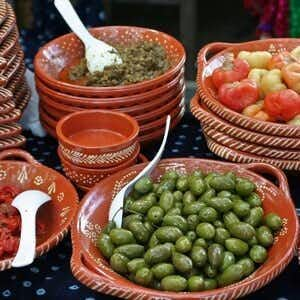
Can you reduce your chance of having a stroke through what you eat? A study from Spain shows that the Mediterranean diet helps to prevent stroke in a vulnerable population.
PREDIMED Tests the Power of the Mediterranean Diet:
The PREDIMED investigation involved more than 7,000 subjects at high risk of cardiovascular complications. The risk factors included diabetes, smoking, hypertension, high LDL cholesterol and a family history of heart disease. They were randomized to one of three dietary programs. The first was the Mediterranean diet supplemented with nuts. Another was the Mediterranean diet with additional extra-virgin olive oil. The control group was supposed to follow a low-fat prudent diet.
How Well Did the Diet Prevent Stroke?
Over the course of the five-year study, control group subjects with a genetic susceptibility to diabetes and stroke were three times more likely to suffer a cerebrovascular accident (stroke). People with the same genetic makeup were at no increased risk if they followed a Mediterranean diet (Corella et al, Diabetes Care, online, Aug. 13, 2013).
What Is a Mediterranean Diet?
Although people talk about “the” Mediterranean diet, no single dietary plan qualifies uniquely as the Mediterranean diet. The volunteers in the PREDIMED study lived in Barcelona, Spain. Consequently, they were accustomed to eating that local diet. But people in France, Italy, Greece and countries in northern Africa all have their own version of a Mediterranean diet.
A Mediterranean diet is rich in vegetables and fruits. Olive oil rather than butter or lard is the primary fat. Generally, people eat relatively little meat and few sweets. People eating the Mediterranean way rely on beans and nuts as regular components of the diet. In addition, they may eat fish or shellfish frequently, at least a few times a week. Herbs and spices are used liberally. In many Mediterranean communities, meals are social occasions accompanied with wine.
The PREDIMED investigators recently summarized what made their study special (Guasch-Ferre et al, Nutrition, Metabolism, and Cardiovascular Diseases, July 2017). They pointed out that the study was not large enough to draw firm conclusions about the Mediterranean diet reducing mortality, although it did cut the risk of stroke and heart attack by about 30 percent. The strengths of the study were:
- a randomized design that tested
- an overall dietary pattern rather than a single nutrient
- and used clinical endpoints rather than surrogate markers like blood sugar or cholesterol
The Importance of Physical Activity:
An independent analysis of older people with cognitive impairment but no dementia found that those who were more fit and physically active fared better on cognitive tests (Blumenthal et al, Psychosomatic Medicine, Jul/Aug. 2017). A Mediterranean-style or DASH diet was associated with better cognition and a lower risk of stroke. In most of the traditional communities that set the pattern for a Mediterranean diet, people were (and often still are) physically active into their 80s or 90s. That might be just as important as diet if you want to prevent stroke.
Mediterranean Diet to Prevent Stroke and Heart Attack:
A recent collaboration by the PREDIMED investigators and scientists from Harvard’s TH Chan School of Public Health found that a Mediterranean diet can help protect against a previously little-recognized risk factor (Wang et al, Circulation, May 23, 2017). The researchers found that high levels of ceramides circulating in the bloodstream increases the risk of heart attack and stroke. (Ceramides are a waxy type of fat found in cell membranes.) But following a healthful Mediterranean diet can prevent stroke and heart attack regardless of the level of ceramides.
Learn More:
If you would like advice on how to follow a Mediterranean diet, you may wish to consult our book, The People’s Pharmacy Quick & Handy Home Remedies, published by National Geographic. You might also wish to listen to some of our interviews, such as Show 989: The Mediterranean Zone Diet, with Dr. Barry Sears, or Show 1056: Longevity, Spice and Diet-Secrets Italians Know That You Don’t, with Dr. Alan Maisel.

